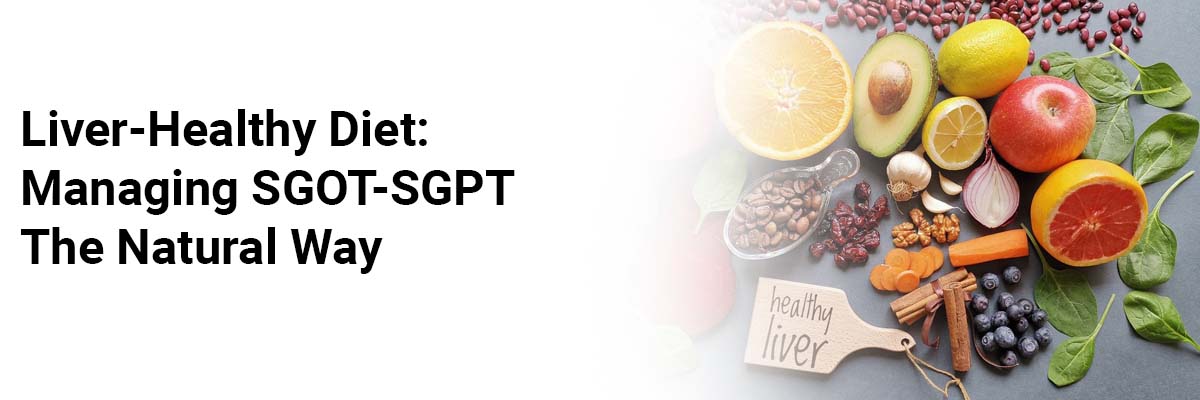
 IJCP Editorial Team
IJCP Editorial Team
Liver-Healthy Diet: Managing SGOT-SGPT The Natural Way
Liver health is paramount for overall well-being, as this vital organ is a central hub for numerous bodily functions, including detoxification, metabolism, and storing essential nutrients. Multiple factors such as faulty lifestyle, alcohol abuse, prolonged disease, and certain medications may bring about liver dysfunction, resulting in acute to chronic disorders, which can even be fatal.
The liver functioning is detected with the help of SGOT and SGPT enzyme tests. The elevated levels of these liver enzymes indicate inflammation, damage, or diseases affecting the liver. Though medication regimens or liver transplants are the ultimate treatment options available for liver distress, various preventive measures can be adopted to avert clinical complexities associated with the liver.
The Liver-Healthy Diet
Adopting a liver-healthy diet is a proactive step towards managing these enzyme levels naturally and promoting optimal liver function.
Coffee helps lower the liver enzyme levels:
Moderate coffee consumption has been linked to a decrease in the occurrence of abnormal liver enzymes in individuals who are at risk for liver diseases. The antioxidants in coffee may protect the liver and reduce inflammation. A review from 2021 revealed that consistent coffee consumption reduces the likelihood of developing NAFLD and diminishes the risk of progressing liver fibrosis.
Fruits and Vegetables aid in detoxification:
Incorporate a variety of colorful fruits and vegetables into your diet, as these are rich in antioxidants, vitamins, and fiber.
- Berries contain antioxidants called polyphenols, which may help protect the liver from damage.
- Grape skin and seeds alleviate symptoms of severe liver problems, including liver enlargement, inflammation, and fat buildup.
- Grapefruit contains two primary antioxidants, naringin, and naringenin, that help protect the liver from injury by reducing inflammation and protecting the liver cells.
Whole Grains assist in weight management:
Opt for whole grains like brown rice, quinoa, and oats as they provide essential nutrients and fiber, aiding digestion and maintaining requisite body weight—crucial for a healthy liver. Oats and oatmeal are high in compounds called beta-glucans, which are especially helpful for the liver.
Lean Proteins for overall body function:
Choose lean protein sources such as dairy products, eggs, poultry, fish, tofu, and legumes. Proteins are essential for tissue repair and overall body function while reducing the burden on the liver compared to high-fat meats.
Healthy Fats help reduce inflammation:
Include sources of healthy fats, like avocados, nuts, and olive oil. These fats support the absorption of fat-soluble vitamins and contribute to a balanced diet without overloading the liver.
- The high content of unsaturated fatty acids in olive oil reduces oxidative stress and improves liver function.
- Nuts generally contain unsaturated fatty acids, vitamin E, and antioxidants that help prevent NAFLD and reduce inflammation.
- Fatty fish, rich in omega-3 fatty acids, help reduce inflammation. These fats may benefit the liver, preventing excessive fat buildup and maintaining liver enzyme levels.
Herbs and Spices improve liver health:
Turmeric, garlic, ginger, and other herbs and spices have anti-inflammatory properties that can benefit liver health.
- Garlic is found to lower AST levels, a vital parameter of liver functioning.
- Curcumin, the active ingredient in turmeric, helps reduce markers of liver damage.
- Sunflower seeds are exceptionally high in vitamin E, which benefits liver health.
Foods to Avoid
- Reduce the intake of saturated and trans fats in fried foods, processed snacks, and certain cooking oils. These fats can contribute to fatty liver disease and inflammation.
- Limit added sugars in your diet by avoiding sugary beverages, candies, and processed foods. Excessive sugar consumption can contribute to fatty liver disease.
- Excessive alcohol can contribute to liver damage. If consumed, do so in moderation or consider eliminating alcohol to give your liver the best chance to recover.
- Excessive salt intake raises the risk of liver conditions.
- Avoid white bread, rice, and pasta as they lack fiber and elevate blood sugar levels.
- Red meat, particularly beef and pork, is high in saturated fat.
- Consumption of highly processed meats should also be restricted due to their elevated sodium and saturated fat content.
Simple Tips for Liver Health
- Opt for a healthy lifestyle, including a balanced diet, regular exercising, and refraining from alcohol and tobacco use.
- Stay adequately hydrated with water and herbal teas. Water helps flush toxins from the body and aids in digestion, benefiting liver function.
- Go for regular health check-ups and get vaccinated.
- Never self-medicate, as consuming unprescribed medicines may impact liver health.
- Know your family history and take requisite precautions.
Conclusion
A liver-healthy diet is a cornerstone for managing SGOT and SGPT levels naturally. By making mindful choices and embracing a balanced, nutrient-rich eating plan, individuals can support liver function, reduce inflammation, and promote overall well-being. It is essential to consult with healthcare professionals for personalized advice based on individual health conditions. Nurturing your liver through a wholesome diet is a proactive step towards a healthier and more vibrant life.

IJCP Editorial Team
Comprising seasoned professionals and experts from the medical field, the IJCP editorial team is dedicated to delivering timely and accurate content and thriving to provide attention-grabbing information for the readers. What sets them apart are their diverse expertise, spanning academia, research, and clinical practice, and their dedication to upholding the highest standards of quality and integrity. With a wealth of experience and a commitment to excellence, the IJCP editorial team strives to provide valuable perspectives, the latest trends, and in-depth analyses across various medical domains, all in a way that keeps you interested and engaged.









.jpg)








.jpg)

Please login to comment on this article